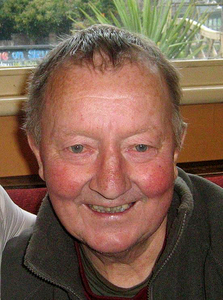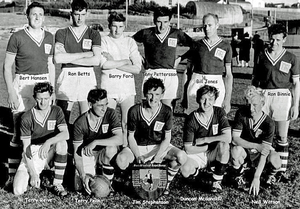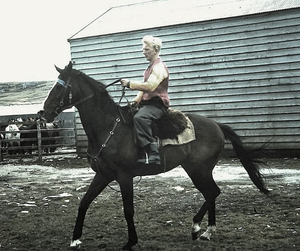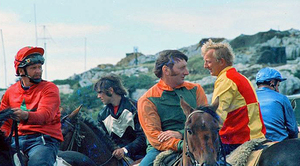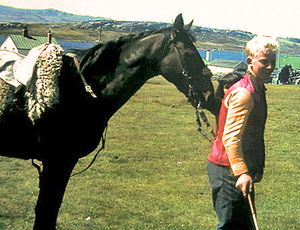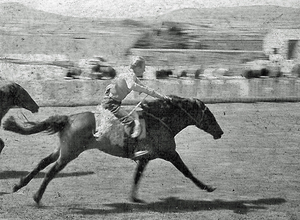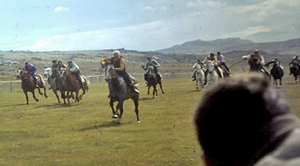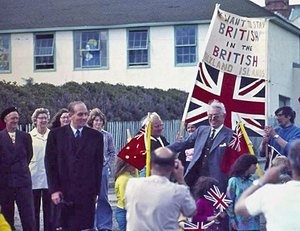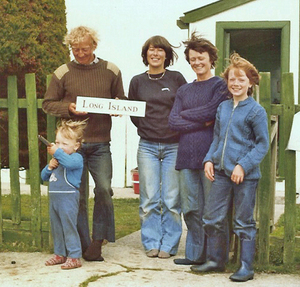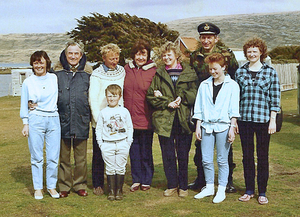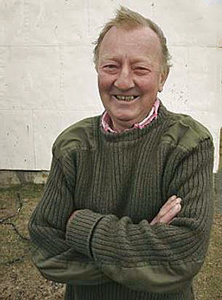WATSON, NEIL
1942-2017 from Falkland Islands
sportsman and farmer, was born in Stanley on 3 May 1942, the son of William (Ben) Henry Charles Watson (1903-1975, who was born at Moffat Harbour, North Arm) and Hannah Maud Lee (1917-1999, who was born at Many Branch, Port Howard). The Watsons also had a daughter – Carol (b.1947)
Neil Watson married Glenda Joyce McKay (born on 29 November 1947 at Sound House, Hill Cove) on 28 May 1966 at Christ Church Cathedral, Stanley. The Watsons had three children: Paul (b.1966) Lisa Marie (b1969) and Ben (b1977). On leaving school Watson first worked in the Customs Department of the Falkland Islands Government before moving to the Treasury as counter clerk/cashier.
Watson’s potential as the greatest all-round sportsman that the Falklands has ever seen was probably first apparent after he joined the Boy’s Brigade. He was a brilliant gymnast whether it was on the rings, vaulting the box or in floor exercises and no one could match him in these disciplines. He also excelled as a runner while with the Boys Brigade and regularly won every event he entered during the annual Boy’s Brigade sports day. He joined the junior section of the local Boxing Club and was such a ‘Will o’ the Wisp’ that no-one could lay a glove on him.
His love for horses began at an early age and his friend and classmate, Eric Goss, recalled that he was given a horse called ‘Shannon’ which originated from Port Howard, which the two boys would ride out on Stanley common whenever the opportunity presented itself. The boys even managed to escape from church one Sunday morning having convinced their parents that they had said their prayers before playing truant. Not content with riding their own horses they would often borrow a couple from the large troop of horses which congregated on Stanley Common and ride bare-back, hanging onto the horse’s mane, whooping and shouting as they galloped around south of Stanley.
Watson also loved football and soon became a regular in the Stanley team, usually in the First Eleven and was so versatile that he could play in any position on the field. He was a first-team regular for many years and he took great pride in pulling on the blue jersey to represent the Falklands against visiting Royal Naval and Royal Marine teams.
At the Stanley Sports Association Christmas Sports meetings the foot events were eagerly contested, and runners would train for many weeks prior to Boxing Day with the Mile run being the Blue Riband event on the programme. At the December 1958 meeting, aged just 16, he achieved the first of his 3 ‘Grand Slams’ – winning all 4 of the major foot events. He did it again in 1960 and 1961. He was never beaten over One Mile or 440 yards. His unofficial time of 5 minutes was believed to have been the fastest time ever recorded until surpassed in 1981 by the Royal Marine Steve Holding. He retired from the foot events after the 1963 meeting but his exploits on the track have never been equalled.
Watson was not content with breaking foot event records as he also established himself as a great jockey, and later a breeder and trainer of horses. Such was his enthusiasm and ability that for many years he would jump off a horse, don his shorts and running spikes, and immediately line-up for a foot event.
Watson’s name first appears in the sports programmes in 1954 when as a 12-year-old he was 2nd in the pony race on ‘Bluebell’ and then in 1957 he won the race on ‘Colleen’. His first win at a Senior level was to come the following year when he took the Open Maiden Plate on ‘Jimmy’ an imported horse which was owned by the then Head of Education, John Swann. After twice finishing 3rd in the Governor’s Cup in 1959 and 1960 he was rewarded for his endeavours by winning the coveted prize for the first time in 1961. He was Champion Jockey in the same year. His incredible performances as an athlete and jockey did not escape the notice of the Stanley Sports Association Chairman, Arthur BARTON, who in his foreword in the official programme for the 1963 50th anniversary meeting wrote:
Spectators here have recently been privileged to watch something which is unique in the history of racing in the Colony, namely, the Champion Jockey is also the Champion sprinter and miler.
Watson was so enthusiastic that he would go anywhere at any time to obtain horses for sports meetings. He once saddled a horse at daybreak on a Sunday morning and rode halfway to Port San Carlos to meet a friend who had a horse called ‘Bobo’ for him to race at the Christmas meeting. When asked what the rush was, he replied, after a slight hesitation: ‘I promised Glenda I would be back in time to take her to the pictures that night and I was’.
He was to win the Governor’s Cup on seven occasions but without doubt the victory which gave him the greatest pleasure was that, in 1981, on his own mare ‘Sally 1’, which he bred and trained at Long Island. Sally was to repeat the feat the following year. Not far behind his memorable 1981 achievement was another Governor’s Cup victory of another of his Long Island bred horses ‘Sandie’ at the 1986 meeting.
He was Champion Jockey in Stanley on seven occasions, but his exploits were not confined to the Christmas meeting as he also journeyed to Darwin and across to West Falklands to participate in their meetings. He was Champion jockey runner-up at the 1959 Darwin meeting.
One of the great aspects of Watson’s attitude to racing, and keeping the sports meetings going, was his eagerness, willingness and kindness in helping others. For many years, the sight of the Long Island troop of horses being brought to Stanley on Christmas Eve by a band of young jockeys was something to behold. There is little doubt that without his input the sports meetings could hardly have continued in recent years. Many a British Serviceman was grateful to him as he always found a horse to lend out for the Armed Forces Challenge.
In the 100 years of Stanley Sports Association Meetings no-one has come near equalling his achievements in terms of being Champion in the saddle and Champion on foot in the same year. He re-wrote the sporting history books in the Falklands. He will be remembered as the Falklands greatest ever all-round sportsman.
Prior to purchasing the farm at Long Island (part of the Green Patch 1980 subdivision) Watson joined FIC as a flight booking agent and later became the shipping office manager. But he always had an interest in being a farmer, and he helped out at the local dairy as a young man. In Stanley he kept horses and would ride to farms whenever he could.
It was a steep learning curve when the farm was bought in 1980, but the more experienced farmers nearby were always around to provide tips and share their knowledge – the farm had 2500 sheep, some cattle, a troop of horses and 17,000 acres with few fences – all of which was quite a challenge. Neil and Glenda Watson spent weeks over the next few winters in a tent in snowy valleys erecting miles of fencing so that the land could be adequately divided for separating their flocks in the future. While still able to do so, Watson would shear his own sheep.
In the latter years of farming with the assistance of family friends the farm began offering farm trips for visiting cruise ships excursions. Thousands of passengers passed through the farm over the years where they were able to view Watson’s dog handling skills, peat cutting, sheep shearing and traditional horse gearing before the passengers took tea and cakes in the Long Island kitchen.
During the Argentine occupation of 1982 the notorious Major Patrico Dowling visited Long Island farm, searching for possible hidden British Royal Marines. ‘Dowling kicked open the door of the house and forced all the Watson family against the wall, but the [12 year-old] girl [Lisa] remained seated, despite the begging of her parents and the shouts of Dowling who then pointed a rifle at her face and several times threatened to shoot. Finally, the Argentine officer gave up and the girl remained seated.’ (Source: MercoPress April 2022). Not surprisingly such behaviour hardened Watson’s attitude and his antipathy towards any possibility of Argentine oversight over the Islands. Watson later provided transport to assist the movement of Paratroopers and their supplies to the front lines. This he did unhesitatingly. His daughter Lisa recalls:
Earlier in the war Neil and Paul Watson also assisted Terry PECK dig up weapons on Long Island sand beach right under the noses of Argentine troops nearby on Long Island Mountain in the middle of the night. The weapons had been left at Long Island by Royal Marines after the invasion. When Terry surreptitiously moved through Long Island on his way to assist the British task force Neil said he would obtain Terry a weapon. Neil, Terry and the 15-year-old Paul crawled up the beach and recovered the buried weapons under cover of darkness.
Neil Watson was a man of strong opinions and firm convictions and was never afraid to express them publicly – particularly on the subject of Falkland Islanders right of self-determination and British sovereignty over the islands. He was much engaged in the political debate, and in lobbying various British ministers about the future of the islands in the 1970s. He became a member of the Falklands Islands Emergency Committee that was formed in 1968, (Later to become the Falkland Islands Association). The Emergency Committee was formed due to concern over negotiations between the British and Argentine Governments which could have led to the transfer of sovereignty. He remained a member of the Association for many years.
Watson was vociferous in his opposition to any concessions to Argentina’s claims over the islands, and he organised a number of public rallies and protests at various times in the late 1970s and early 1980s. His daughter Lisa recalls that: “I grew up listening to people gathering at our house at 6a Pioneer Row to chat politics pre-war before we moved to Long Island … He loved nothing more than a debate and the kitchen at Long Island was always noisy with discussion as he encouraged his children and all his friends and their friends to debate every possible subject and issues”.
In 1981 Governor Rex HUNT brought a visiting senior Foreign Office official, John Ure to stay for two nights with the Watsons at Long Island. Ure was trying to sell the idea of ‘leaseback’ to Islanders, and it is possible that the Governor chose the Watsons so that Ure could appreciate how strongly opposed people were to the idea. Ure enjoyed a ride on the Watson’s horse ‘Sally’ along the beach, but failed to convert the Watsons, or indeed anyone else.
In July 2007 the Royal Humane Society (RHS) awarded farmers Neil Watson and Pat Whitney Parchment Awards, and Chris Hawksworth a Vellum Award for an act of "real courage". On February 10, 2006, a cruise ship was to land a group by zodiac inflatable boat on the beach at Uranie Bay, East Falklands, prior to a visit to Long Island farm. This was despite the fact that Watson had warned the ship that he considered the sea conditions unsuitable. The inflatable, with ten passengers, turned over in large waves twenty metres from the shore. The passengers were thrown into the sea, and some were trapped underneath the boat. All the tourists were rescued, and dry clothing and warm drinks were provided at Long Island farmhouse. The passengers were then driven overland to Stanley to be reunited with the ship. On hearing about the award Watson said he was very pleased to be given such a prestigious award. " We only did what anyone would do in the situation,"
Neil Watson was intensely proud of being descended from one of the first families ever to settle in the Falklands – his ancestor James Watson arrived in the Falklands on 17 November 1840 to work for John Bull WHITINGTON in 1840). It is on the foundation of such families that the Falklands was built and still prospers today.
References
Rex Hunt; My Falkland Days. Politico's. 2002. ISBN 978-1842750179.
Lisa Watson; Waking up to war; Self published, 2010. (Available on Kindle)
Comments
Revisions
October 2023 Biography first added to Dictionary
